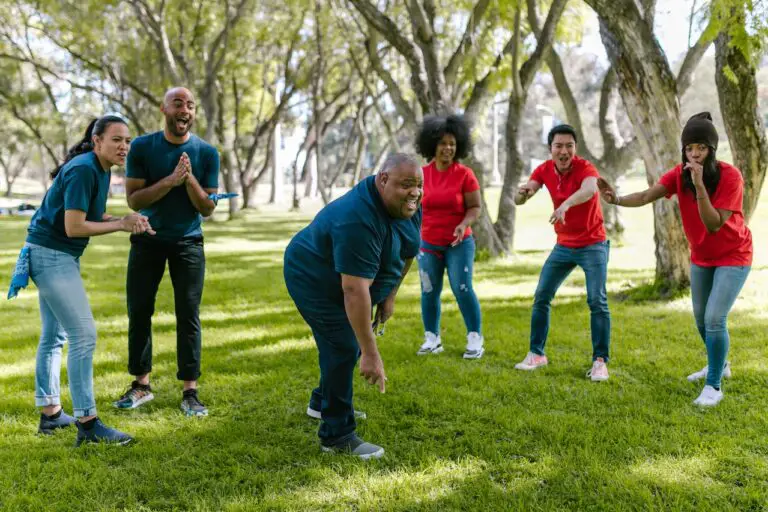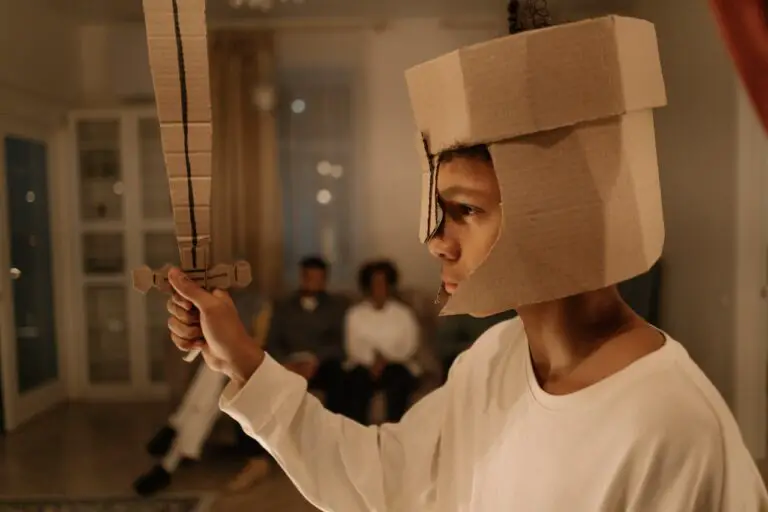Role play is one of the most under-used activities in the EFL/ESL classroom. I’ve used it to great success on many occasions, and it’s a vital tool for all teachers to have in their arsenal.
Role play in the EFL/ESL classroom is fun, creative, and authentic. It can help less confident students develop their speaking skills, bring some energy to the classroom, and provide relevant, valuable vocabulary. It is flexible and personal, meaning each class can benefit in their own way.
The positives of role play are many, and when you understand them, you can apply the technique to every class with confidence in its success. You’ll also know when not to use it.

What is role play, and why should we all use it?
Role play in EFL/ESL is when students act as different characters in a scenario and use English to resolve a situation, come to an agreement, or just go on an adventure together. It’s similar to dramatization and simulation, but relies on in-character improvisation. It’s often performed in pairs or small groups, and there’s no emphasis on acting quality or dressing up.
For an in-depth comparison of role play, simulation and dramatization, read my article on the subject.
So let’s look at all the benefits of using role play.
1. Role play elicits valuable, relevant vocabulary
Although they often begin with a quick brainstorm of some useful vocabulary, role plays are full of moments when a student lacks vocabulary. And they really want to know the word. Without the word, they struggle to get their point across, just like in proper conversations.
So every time they can’t find the word and you provide it, you can be sure they’ll find it relevant and valuable. This is crucial, as I explain in this article on the best method for learning vocabulary.
2. Role play is natural and practical
Everyone knows how to role play. As children, it comes as second nature – pretending to be heroes on the playground, or imagining we’re a dog running up and down the corridor. It’s easy for everyone to get stuck in.

Not only that, but the scenarios and situations apply to real life. Often, the language learned from textbooks and worksheets is contrived and disconnected from reality. We don’t use it in real conversations. In role play, not only do students practice language, but they learn how to have a genuine interaction.
Role play is accessible and confidence-boosting
Speaking activities are often a stumbling block for low-confidence students. They either don’t trust their English ability or they’re too shy to express themselves in front of others.

Presenting in front of the class, or answering repeated questions from the teacher, can be quite intimidating. In contrast, taking on the role of another person can help timid students step outside their comfort zone, and the nerve-racking performance aspect of those other activities is disguised in low-stakes dialogue.
Role play provides energy and creativity
Not just shy students benefit from role plays. Those who bring energy and creativity to classes have a chance to express themselves.
A lot of language learning can be formulaic and restrictive. Students who like to move around and let their imagination run wild ordinarily struggle with classroom work. In role play, though, they can have a great time improvising conversations and stories. It’s a welcome break from worksheets and textbooks.


Role play is flexible and adaptable
Depending on how you present the activity and the personalities of your students, role play can be silly or serious, snappy or in-depth, and related to what makes them tick. Some role plays might last two minutes, while others might roll on for half an hour.
You can adapt the role plays to cover a target topic. Put them in situations when they’ll need to use the present perfect and watch them apply their skills. Or, if the vocabulary you’ve been studying is all about family, then focus your role play scenarios about sibling interactions, or people getting married.
Sure, you may not hit all the language objectives. Some grammar might get lost along the way, and your students might not say every word on your vocab list. But if you’re creative, you can go far beyond all of that and engage in deep, engaging learning.
Role play is fun
This is more important than you think. In fact, it’s the number one reason I use it in my classes. When I have students excited about my lessons, I know they’re ready to learn, and they’ll associate the language parcticed in the session with positive memories.

Not everything fun is good for learning. However, thanks to the reasons above, I know my students are developing their skills while having a great time. And it’s fun for me too!
When not to use role play
If role play is so wonderful, why don’t all teachers use it all the time? Well, sometimes it’s not suitable. While I think more teachers should use it, I wouldn’t suggest building every lesson around it.
The first situation in which it might not be beneficial is when you need to focus on specific grammatical structures. Because of the improvised nature of role play, it’s no good for drilling. Often, repetition is crucial at an early stage of understanding, and this requires a more structured activity.
The second time I would avoid role play is if it consistently excludes a student or makes them feel uncomfortable. Occasionally, the specific make-up of people in a group doesn’t mix. This is quite easy to detect early on. Some members of the group might dominate or deliberately leave out certain individuals.
To learn more about how to manage role plays with different age groups, check out my articles Teaching EFL/ESL to Teenagers & Adults With Role Play and How to Teach Children EFL/ESL With Role Play: Best tips.
While it can often be remedied by switching up groups or a with re-clarification of expectations, if it happens too often, you’ll make some of your students dread the mere mention of the activity.
Speaking of things happening too often, using role play all the time has diminishing returns. It can get repetitive if you overuse it.
To avoid this, either have short, frequent role plays (no more than ten minutes every class), or have longer role play sessions every now and then. Variation is key. If you sense students are getting bored with role play, drop it for a few weeks and do something else, then come back later.
If you have doubts about role play, make sure to read my article on the 5 Problems to Avoid With Role Play in EFL/ESL
Get things role-ing
So now you know why role play is so great, it’s time to implement it more in your lessons. And don’t forget simulation and dramatization, which I’ve covered in this article.
Take it easy at first. Introduce it, see what happens and adjust. If students get too carried away, rein them in, or they might feel too shy, in which case you’ll have to show them how it’s done.
A great tip is to have a few role plays in your back pocket for those classes that end ten minutes early – bust out a role play and know the activity isn’t just filler, but one of the best learning experiences you can offer.
For more information and guidance on role play in the EFL/ESL classroom, check out all my articles on the subject:
Why All EFL/ESL Teachers Should Use Role Play Activities
Dramatization vs Simulation vs Role Play: Guide for EFL/ESL
5 Problems to Avoid With Role Play in EFL/ESL + Solutions
How to Teach Children EFL/ESL With Role Play: Best tips
Teaching EFL/ESL to Teenagers & Adults With Role Play
5 Awesome EFL/ESL Role-play Scenarios for Teens (+ tips)
5 Exciting EFL/ESL Role Play Scenarios for Kids (+ tips)
5 Engaging EFL/ESL Role Play Activities for Adults (+ tips)







